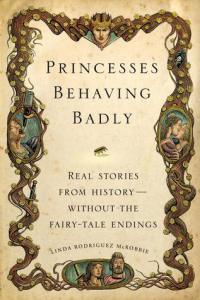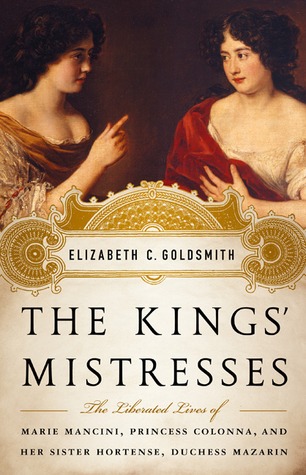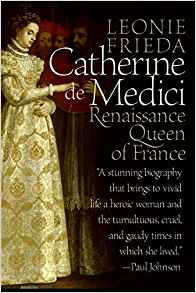
by fljustice | Nov 22, 2013 | Biographies, Books, History, Reviews, Wonderful Women
Princesses Behaving Badly: Real Stories from History without the Fairy-Tale Endings
by Linda Rodriquez McRobbie
“Once upon a time, there lived a beautiful princess who wasn’t afraid to cheat, deceive, seduce or murder anyone who got in her way.”
 I like these kinds of books—collections of short bios of (mostly) unknown women who are remarkable for doing daring/unusual things down through history. I have one on women at sea; several on women warriors; others on women explorers, mathematicians, and scientists. They generally follow a pattern of one to two page biographies written in a breezy, modern style emphasizing the outrageousness (for her time) of the woman’s actions.
I like these kinds of books—collections of short bios of (mostly) unknown women who are remarkable for doing daring/unusual things down through history. I have one on women at sea; several on women warriors; others on women explorers, mathematicians, and scientists. They generally follow a pattern of one to two page biographies written in a breezy, modern style emphasizing the outrageousness (for her time) of the woman’s actions.
Why do I like these kinds of books? To be honest, they’re snack food—light fluffy reads that give me a break from heavy turgid research books. They also remind me that—despite what the history books tell us—some women in every era, somewhere in the world, were doing remarkable things. The majority (like today) lived ordinary lives, but a few women always stood out and lived extraordinary ones. I like learning about them and being inspired to tell their stories. This kind of book is a good starting point for any historical novelist looking for inspiration.
(more…)

by fljustice | May 21, 2012 | Biographies, Books, Reviews, Wonderful Women
“The Kings’ Mistresses” by Elizabeth C. Goldsmith
 I love a good story about women pushing the boundaries in times past, especially when they are based on real people. The Kings’ Mistresses is the true tale of two sisters: Marie Mancini and her younger sister Hortense, the nieces of one of the most powerful men in seventeenth century France, Cardinal Mazarin (a protégé of Richelieu.) Mazarin, rose from obscure roots in Rome to become Prime Minister to the Queen Regent of France, Anne of Austria and her son Louis XIV. Along the way he acquired great wealth as well as influence and enemies. He hoped to consolidate his influence by the well-known ploy of strategic marriage, so he summoned his Italian nieces and nephews to the French court. In 1653 Marie, “a dark-haired and intelligent-looking adolescent of thirteen” and Hortense, “a mere child of six, with curly black hair and striking in her delicate beauty” left their home in Rome to travel to Paris. It was the first of many journeys in their fascinating lives. (more…)
I love a good story about women pushing the boundaries in times past, especially when they are based on real people. The Kings’ Mistresses is the true tale of two sisters: Marie Mancini and her younger sister Hortense, the nieces of one of the most powerful men in seventeenth century France, Cardinal Mazarin (a protégé of Richelieu.) Mazarin, rose from obscure roots in Rome to become Prime Minister to the Queen Regent of France, Anne of Austria and her son Louis XIV. Along the way he acquired great wealth as well as influence and enemies. He hoped to consolidate his influence by the well-known ploy of strategic marriage, so he summoned his Italian nieces and nephews to the French court. In 1653 Marie, “a dark-haired and intelligent-looking adolescent of thirteen” and Hortense, “a mere child of six, with curly black hair and striking in her delicate beauty” left their home in Rome to travel to Paris. It was the first of many journeys in their fascinating lives. (more…)

by fljustice | Feb 29, 2012 | Biographies, Books, Free stuff, Guest Post, History, Wonderful Women
Guest Post: Glynis Ridley on “The Discovery of Jeanne Baret”
 I’ve been in rewrite mode lately and ignoring my blog. But just in time for Women’s History Month, Glynis Ridley has kindly stepped in with a guest post talking about her non-fiction adventure story The Discovery of Jeanne Baret: A Story of Science, the High Seas, and the First Woman to Circumnavigate the Globe. I first ran across Jeanne Baret’s remarkable story in another book She Captains: Heroines and Hellions of the Sea by Joan Druett; and, yes, women have commanded navies, captained ships and served as crew long before modern times. I was delighted to have the opportunity to read Ms. Ridley’s riveting account of one these remarkable and neglected woman. Thanks to her publisher Broadway Paperbacks for providing two copies for a giveaway. (See the end of the article for details.) (more…)
I’ve been in rewrite mode lately and ignoring my blog. But just in time for Women’s History Month, Glynis Ridley has kindly stepped in with a guest post talking about her non-fiction adventure story The Discovery of Jeanne Baret: A Story of Science, the High Seas, and the First Woman to Circumnavigate the Globe. I first ran across Jeanne Baret’s remarkable story in another book She Captains: Heroines and Hellions of the Sea by Joan Druett; and, yes, women have commanded navies, captained ships and served as crew long before modern times. I was delighted to have the opportunity to read Ms. Ridley’s riveting account of one these remarkable and neglected woman. Thanks to her publisher Broadway Paperbacks for providing two copies for a giveaway. (See the end of the article for details.) (more…)

by fljustice | Dec 2, 2011 | Biographies, Books, History, Reviews, Wonderful Women
“Catherine the Great: Portrait of a Woman” by Robert K. Massie
From the book jacket:
“The Pulitzer Prize-winning author of Peter the Great, Nicholas and Alexandra, and The Romanovs returns with another masterpiece of narrative biography, the extraordinary story of an obscure young German princess who traveled to Russia at fourteen and rose to become one of the most remarkable, powerful, and captivating women in history.”
 Massie delivers a wonderfully researched and readable book. My knowledge of Catherine the Great was vague to the point of mythical. I had hazy memories of multiple lovers, a (possible) scandal about her and a horse, and a movie starring Greta Garbo. The lovers were real, but few; there was no mention of the horse; and the Garbo movie turned out to be about Queen Christina of Sweden who lived a century earlier. So much for memory.
Massie delivers a wonderfully researched and readable book. My knowledge of Catherine the Great was vague to the point of mythical. I had hazy memories of multiple lovers, a (possible) scandal about her and a horse, and a movie starring Greta Garbo. The lovers were real, but few; there was no mention of the horse; and the Garbo movie turned out to be about Queen Christina of Sweden who lived a century earlier. So much for memory.
To say Catherine is a fascinating character is to do her a disservice. Massie shows her towering intellect, force of personality, and steely resolve from an early age. He also shows her craving for love and approval; denied in childhood and in her marriage. But her story is not a simplistic psycho-drama, it’s populated with complicated characters, shifting political agendas (both domestic and foreign), and colored with the burgeoning philosophies of the Age of Enlightenment. (more…)

by fljustice | Jan 28, 2011 | Biographies, Books, Reviews, Wonderful Women
“Catherine de Medici: Renaissance Queen of France” by Leonie Frieda
Long, long ago in a youth far, far away, I read a biography of Catherine de Medici, so I was already familiar with her story. I have to admit, the details were hazy: I remembered something about poison, religious wars and that she was Mary, Queen of Scots’ mother-in-law. Then a couple of years ago, my husband and I took a biking vacation in the Loire valley and visited numerous castles and gardens along way, several associated with Catherine and her rival Diane de Poitiers; so I was reacquainted with the general outlines of her story. Which brings me to: Catherine de Medici: Renaissance Queen of France by Leonie Frieda.
 From the Introduction:
From the Introduction:
“Catherine de Medici has variously been called ‘The Maggot from Italy’s Tomb’, ‘The Black Queen’ and ‘Madame La Serpente’. To many she is the very incarnation of evil. It is, I believe, as mistaken a judgment as it is bigoted. Yet it is not far removed from the overall verdict of history on one of the most remarkable women of the sixteenth century.” (more…)

 I like these kinds of books—collections of short bios of (mostly) unknown women who are remarkable for doing daring/unusual things down through history. I have one on women at sea; several on women warriors; others on women explorers, mathematicians, and scientists. They generally follow a pattern of one to two page biographies written in a breezy, modern style emphasizing the outrageousness (for her time) of the woman’s actions.
I like these kinds of books—collections of short bios of (mostly) unknown women who are remarkable for doing daring/unusual things down through history. I have one on women at sea; several on women warriors; others on women explorers, mathematicians, and scientists. They generally follow a pattern of one to two page biographies written in a breezy, modern style emphasizing the outrageousness (for her time) of the woman’s actions.



